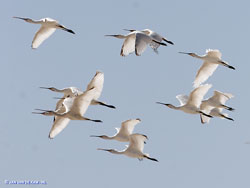Lepelaar vliegt gewoontegetrouw verder dan goed voor hem is

Lepelaars die in het zuiden van Europa overwinteren hebben een hogere overleving dan vogels die naar de ‘traditionele’ overwinteringsgebieden in West-Afrika vliegen. Toch blijven opvallend veel vogels ieder najaar helemaal naar Afrika vliegen. De lepelaars laten hiermee zien dat gewoontegetrouw gedrag een belangrijke beperking kan zijn bij de noodzakelijke aanpassing van vogels aan een veranderend klimaat of leefgebied. Dat schrijven de Groningse biologe Tamar Lok en collega’s in The American Naturalist.
Lok en collega’s analyseerden de gegevens van ruim tweeduizend lepelaars die tussen 1988 en 2010 als jong in Nederlandse kolonies werden geringd. Vervolgens keken zij waar deze vogels in de winter werden teruggezien. Tussen hun meest noordelijke overwinteringsgebieden in Frankrijk en de meest zuidelijke, in Senegal, zit in vogelvlucht een verschil van maar liefst 4.000 kilometer.
Overleving
Het onderzoek liet zien dat vogels die niet helemaal naar Afrika doorvlogen, een hogere overleving hadden. De vogels die in Frankrijk of op het Iberische schiereiland bleven, hadden ruim tien procent meer kans om de volgende zomer te halen dan de Afrika-gangers.
Op basis van de getallen zou men verwachten dat er in de loop der jaren steeds meer lepelaars in Europa blijven. De onderzoekers zagen inderdaad zo’n verschuiving, maar lang niet zo groot als gedacht.
Gewoontegetrouw
Ecologische theorieën gaan ervan uit dat vogels gebieden met een lagere kwaliteit alleen gebruiken als de soortgenotendichtheid in de betere gebieden te hoog wordt. Op een relatief kleine schaal, bijvoorbeeld binnen een broedgebied, lijkt die theorie ook te kloppen, schrijven Lok en collega’s. Maar hun onderzoek toont aan dat op de schaal van een complete trekroute andere mechanismen sterker zijn; hun gewoontegetrouwe trekgedrag ‘dwingt’ de vogels keuzes te maken die niet langer de beste voor ze zijn.
Klimaatverandering
De lepelaars geven met hun trekgedrag belangrijke aanwijzingen voor het onderzoek naar bijvoorbeeld de gevolgen van snelle omgevingsveranderingen. Ook al ervaart een deel van de vogels dat het in een ander overwinteringsgebied beter toeven is, toch blijven grote groepen de oude gewoonten trouw. Dat ‘traditionele’ gedrag maakt het voor een populatie dus moeilijker om zich aan te passen aan veranderingen in het klimaat of in hun leefgebied, bijvoorbeeld ten gevolge van menselijke ingrepen.
Noot voor de pers
Meer informatie:
-
Tamar Lok
-
Otto Overdijk, e-mail: o.overdijk@natuurmonumenten.nl
-
Theunis Piersma of e-mail: theunis.piersma nioz.nl
